| Srl | Item |
| 1 |
ID:
181205
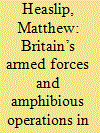

|
|
|
|
|
| Summary/Abstract |
Gallipoli left a lasting impression upon both the countries that participated and many that did not. It has been argued that the campaign negatively influenced Britain’s interwar amphibious preparations. Instead, this article will show that Britain’s armed forces were largely unaffected by such memories, and maintained their relative global standing in theory, equipment and training exercises for landing operations. The paper also highlights the role of amphibious warfare in fighting the many ‘little wars of Empire’ during the period.
|
|
|
|
|
|
|
|
|
|
|
|
|
|
|
|
| 2 |
ID:
155115
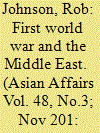

|
|
|
|
|
| Summary/Abstract |
The First World War in the Middle East swept away five hundred years of Ottoman dominion. It ushered in new ideologies and radicalized old ones – from Arab nationalism and revolutionary socialism to impassioned forms of atavistic Islamism. It created heroic icons, like the enigmatic Lawrence or the modernizing Atatürk, and it completely re-drew the map of the region, forging a host of new nation states, For many, the self-serving intervention of these powers in the region between 1914 and 1919 is the major reason for the conflicts that have raged there on and off ever since. Yet many of the most common assertions about the First World War in the Middle East and its aftermath are devoid of context. This article argues that, far from being a mere sideshow to the war in Europe, the Middle Eastern conflict was in fact the centre of gravity in a war for imperial interests. Moreover, contrary to another persistent myth of the First World War in the Middle East, local leaders and their forces were not simply the puppets of the Great Powers. The way in which these local forces embraced, resisted, succumbed to, disrupted, or on occasion overturned the plans of the imperialist powers for their own interests in fact played an important role in shaping the immediate aftermath of the conflict – and in laying the foundations for the troubled Middle East.
|
|
|
|
|
|
|
|
|
|
|
|
|
|
|
|
| 3 |
ID:
130653
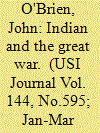

|
|
|
| 4 |
ID:
130654
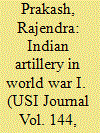

|
|
|
| 5 |
ID:
097299
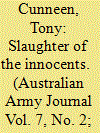

|
|
|
| 6 |
ID:
158155
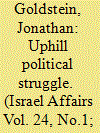

|
|
|
|
|
| Summary/Abstract |
Russian-Jewish army officer Joseph Trumpeldor (1880–1920) was arguably the most celebrated Jewish military hero of the first half of the twentieth century. He lost his left arm during the Russo-Japanese War of 1904–1905 and endured a year-long Japanese imprisonment. In 1905–1906, en route back to European Russia, Trumpeldor visited the Manchurian city of Harbin and attempted to impart Zionism to the local Russian-Jewish population, albeit with very limited success. Trumpeldor’s personal commitment to Zionism received its fullest expression in 1912 when he emigrated to Kibbutz Degania in Ottoman Palestine and subsequently died in defence of the Tel Hai farming community. His career inspired the Zionist movement named after him, Brit Trumpeldor. Abbreviated BETAR, it influenced leaders of the Jewish exodus from China in 1948–1949 and energised the Herut/Likud parties in Israel. Viewing Trumpeldor as only partially successful in his political efforts in Japan and Manchuria may somewhat tarnish the myth of the one-armed soldier and pioneering farmer. The inclusion of the Japanese and Manchurian dimensions of Trumpeldor’s uphill political struggle situates this hero within a far more realistic, and less Eurocentric, context.
|
|
|
|
|
|
|
|
|
|
|
|
|
|
|
|